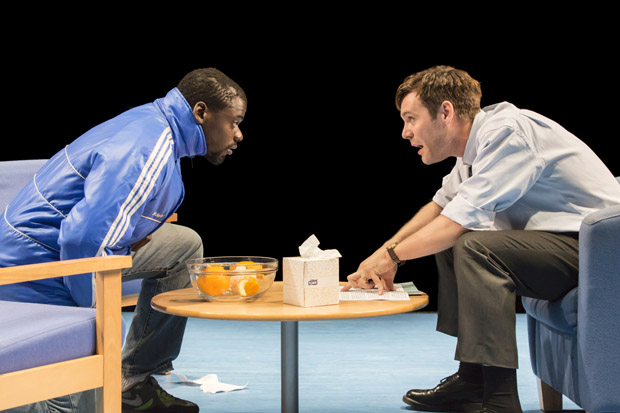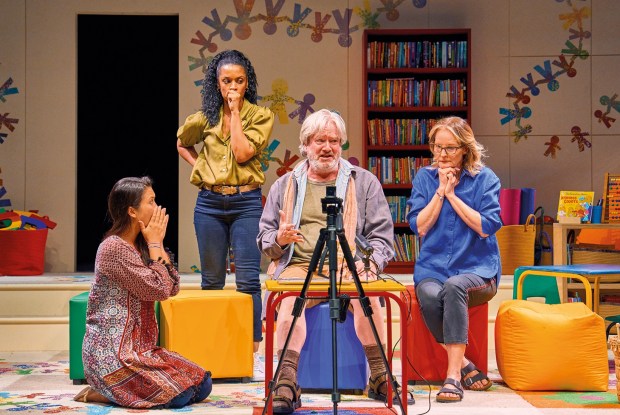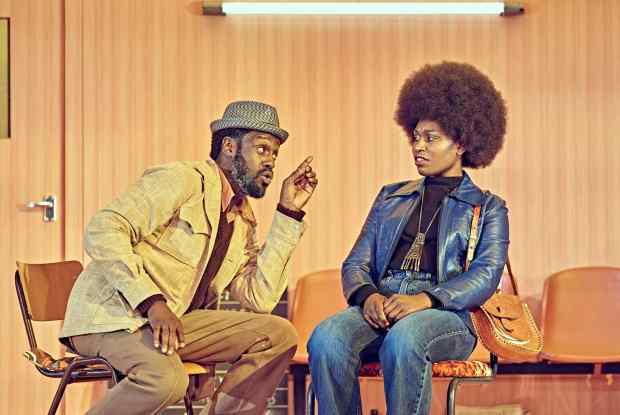Blue/Orange by Joe Penhall enjoys the dubious status of a modern classic. A black mental-health patient, Christopher, is about to be freed from a clinic but his cautious young shrink, Bruce, wants to keep him under observation. His senior colleague, Robert, thinks a dose of the big bad world will help to cure the nervy, delusional Christopher, who claims Idi Amin as his father and insists that all oranges are blue. He’s clearly unstable and though he’s highly irascible he hasn’t yet threatened himself, or anyone else, so he deserves his freedom. It’s the kind of knife-edge conundrum faced by clinicians every day.
Then, a twist. Robert professes support for R.D. Laing, who argued that insanity was a fiction, a form of cultural libel, used by the self-deluding majority as a pretext to lock up outcasts and weaklings under the guise of compassionate assistance. With Christopher as a lab rat, Robert hopes to test a new theory that bipolarity among black men is fomented by white prejudice. But first he must oust Bruce and take over Christopher’s case. Battle commences.
Robert sets about poisoning Christopher’s mind against Bruce without the slightest regard to the effect these head-games might have on a man with a fragmenting personality. When Bruce is heard quoting Christopher’s description of himself as an ‘uppity nigger’, Robert pounces. He accuses Bruce of racially insulting a patient. More twists follow in this astonishing script which takes the audience on a two-hour white-knuckle ride. Never for a moment is it clear which way the action is heading. Will Bruce redeem Christopher? Will Robert be exposed as a closet racist? Will Christopher grab that pencil and stab somebody in the face?
One of the glories of the play is that it embraces so many genres without settling into the traditional boundaries of any particular category. It has the tempo and structure of a comedy without being particularly funny. And yet, at the same time, it’s howlingly and alarmingly ludicrous. The theme is madness but it reveals very little about neurological dysfunction and focuses instead on the mental health of the shrinks. It might be interpreted as a courtroom drama in which the medical profession, and by extension the whole of society, is on trial. It’s also a disquisition on ideology that demonstrates how political correctness has degenerated from an instrument of liberty into a weapon of dictators.
The visual gestures in Matthew Xia’s superb production are beautifully austere. The action takes place on a lonely circular rostrum — a sacrificial altar, perhaps — surrounded by a deep and vacant moat. The palette is blank except for the turquoise floor tiles and the beige wooden furniture that offer a subtle hat tip to the play’s chromatic title. David Haig is terrific as the wheedling, ruthless Robert whose kindly veneer conceals deep rifts of anger and resentment. Daniel Kaluuya manages to find all Christopher’s contradictions, his charm, his aggressive likability, his hair-trigger temper and his penetrating street-smart wit. The audience were riveted throughout. There wasn’t a cough, a whisper or a flicker of movement from any corner. Extraordinary. I came out in a bizarre mood somewhere between euphoria and disorientation. (I emerged from my first encounter with Chekhov in the same baffled condition.) I wasn’t quite sure what I’d just seen but I knew I had to watch it all over again.
Labelling problems at the Menier. David Baddiel’s new show, My Family: Not The Sitcom, sounds like a household satire but it’s an amusing solo effort about the comedian’s mum and dad. The former has kicked the bucket and the other is taking aim with his boot. Forgive the glib tone but Baddiel is equally cynical about his parents’ mortality. He evidently waited till his mother’s death before speaking publicly of her long-term romance with a collector of golf memorabilia. And he’s unlikely to have revealed her forays into erotic doggerel while she was still alive. Not that he doesn’t love his mum. The portrait is quirky, engaging and affectionate. She craved the limelight and once gatecrashed a show he was performing on live TV (with his permission, of course), and she was always keen to place herself prominently among the celebs at red carpet events.
His father, likewise, cannot have been consulted about the show because he suffers from Pick’s disease, which scrambles the brains and weakens its victims’ social inhibitions. Baddiel was informed by a consultant that his dad was showing signs of truculence, moodiness and a taste for coarse sexual ribaldry. Baddiel: ‘Does he have a condition or have you just met him?’ The comic also offers his analysis of Twitter’s mass appeal. ‘It’s a chance to turn the volume up on yourself.’ Then again, the same applies about football, religion, terrorism and whale-hunting. And stand-up comedy.
Got something to add? Join the discussion and comment below.
Get 10 issues for just $10
Subscribe to The Spectator Australia today for the next 10 magazine issues, plus full online access, for just $10.
You might disagree with half of it, but you’ll enjoy reading all of it. Try your first month for free, then just $2 a week for the remainder of your first year.














Comments
Don't miss out
Join the conversation with other Spectator Australia readers. Subscribe to leave a comment.
SUBSCRIBEAlready a subscriber? Log in